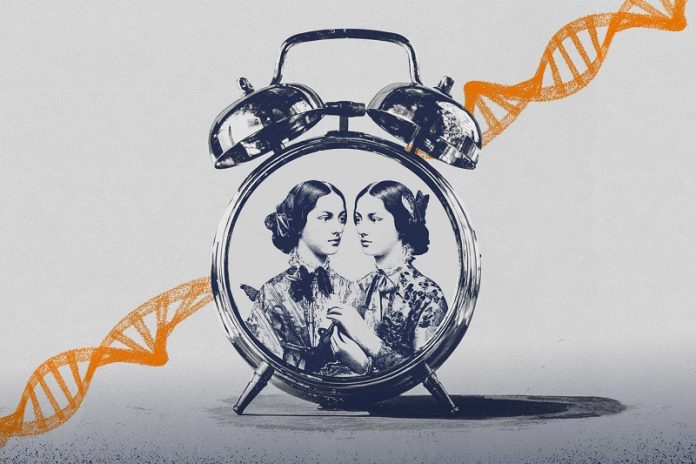
A new study from psychologists at the University of Virginia has found that biological aging, measured through “epigenetic clocks,” may predict who experiences memory decline by midlife.
The research, published in the journal Aging, also suggests that growing up in lower socioeconomic conditions makes people more vulnerable to this effect.
Epigenetic clocks are tools scientists use to measure biological age—the age of the body’s cells and systems—rather than chronological age, which simply counts years.
They track changes in the way genes are expressed over time, often influenced by environment, stress, or lifestyle.
In this study, researchers focused on two clocks, known as GrimAge and PhenoAge, which have already been linked to diseases such as cancer, heart disease, and dementia.
Lead author Sophie Bell, a doctoral student in psychology, worked with her adviser, Professor Eric Turkheimer, to study identical twins from the long-running Louisville Twin Study, which has followed participants since childhood.
By comparing twins, who share all of their genes and often similar early environments, the team was able to isolate differences linked to biological aging.
The findings were striking. Within twin pairs, the sibling who was aging faster biologically also showed more memory and thinking difficulties in middle age. This suggests that biological age may be a stronger predictor of cognitive decline than the number of birthdays someone has celebrated.
Another key discovery was the role of poverty. Twins who grew up in families with fewer resources showed a stronger connection between accelerated epigenetic aging and midlife cognitive problems.
“Our findings show that early life disadvantage may make people more sensitive to the effects of biological aging on brain health,” Bell explained.
This research brings together three threads that scientists had studied separately before: poverty, cognitive decline, and epigenetic aging.
For the first time, it shows how they intersect. Previous work had already shown that childhood poverty predicts memory decline later in life, and that lower socioeconomic status is tied to faster biological aging. Now, this study confirms that both factors work together to influence brain health.
Bell’s work is not only academic—it is also shaping her clinical practice. She is training to become a clinical neuropsychologist and currently works with dementia patients at the UVA Memory and Aging Care Clinic. Looking ahead, she plans to continue analyzing twin data for her dissertation, focusing on biological markers of Alzheimer’s disease and how they relate to memory decline.
“Studying twins helps narrow down the possible causes,” Bell said. “If one twin shows faster aging and more cognitive decline than the other, we can look more closely at life experiences to understand why.”
Her research underscores the importance of both biology and environment in shaping how we age—and points to the lasting impact of childhood conditions on lifelong brain health.
If you care about health, please read studies that vitamin D can help reduce inflammation, and vitamin K could lower your heart disease risk by a third.
For more health information, please see recent studies about common exercises that could protect against cognitive decline, and results showing this MIND diet may protect your cognitive function, prevent dementia.



